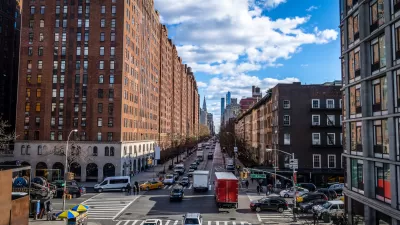Cities like New York and Los Angeles are moving to build green infrastructure as the need for spongier urban spaces becomes more apparent.

Writing in Wired, Matt Simon warns that New York City needs to adapt to protect its citizens and infrastructure from future flooding like the city experienced during Hurricane Ian and recent rains.
As Simon explains, “On a warming planet, it’ll rain more and individual storms will get more intense. This pain will be especially acute in urban areas, which are built on stormwater infrastructure designed to handle the rainfall of yesteryear.” Now, old infrastructure can’t keep up. “Ancient wastewater systems are now tasked with getting rid of ever-bigger inundations.”
Meanwhile, hard, impermeable surfaces like concrete and asphalt effectively seal cities, leaving few places where water can drain into the ground. “Better sewer systems will be indispensable, sure, but planners are also fundamentally reimagining urban areas as “sponge cities” designed to mitigate flooding by absorbing water.”
Today, cities like New York and Los Angeles are working to reverse the problem by building green infrastructure such as rain gardens, bioswales, blue belts, and permeable pavement. In places like Los Angeles, this much-needed water will also help replenish underground aquifers.
According to Simon, “Green spaces don’t just mitigate flooding. They beautify the urban landscape and improve residents’ mental health. They filter out microplastics and other pollutants, keeping them from reaching sensitive water bodies like rivers. And when the weather is hot, they cool neighborhoods, because plants ‘sweat.’”
FULL STORY: New York Needs to Get Spongier—or Get Used to More Floods

Planetizen Federal Action Tracker
A weekly monitor of how Trump’s orders and actions are impacting planners and planning in America.

Maui's Vacation Rental Debate Turns Ugly
Verbal attacks, misinformation campaigns and fistfights plague a high-stakes debate to convert thousands of vacation rentals into long-term housing.

Restaurant Patios Were a Pandemic Win — Why Were They so Hard to Keep?
Social distancing requirements and changes in travel patterns prompted cities to pilot new uses for street and sidewalk space. Then it got complicated.

Charlottesville Temporarily Has No Zoning Code
A judge ordered the Virginia city to throw out its newly revised zoning code, leaving permitting for new development in legal limbo.

In California Battle of Housing vs. Environment, Housing Just Won
A new state law significantly limits the power of CEQA, an environmental review law that served as a powerful tool for blocking new development.

Boulder Eliminates Parking Minimums Citywide
Officials estimate the cost of building a single underground parking space at up to $100,000.
Urban Design for Planners 1: Software Tools
This six-course series explores essential urban design concepts using open source software and equips planners with the tools they need to participate fully in the urban design process.
Planning for Universal Design
Learn the tools for implementing Universal Design in planning regulations.
Heyer Gruel & Associates PA
JM Goldson LLC
Custer County Colorado
City of Camden Redevelopment Agency
City of Astoria
Transportation Research & Education Center (TREC) at Portland State University
Jefferson Parish Government
Camden Redevelopment Agency
City of Claremont





























